
| |||||||||||||||||||||||||||
| Total population | |||||||||||||||||||||||||||
|---|---|---|---|---|---|---|---|---|---|---|---|---|---|---|---|---|---|---|---|---|---|---|---|---|---|---|---|
| 133–150 million [1] | |||||||||||||||||||||||||||
| Regions with significant populations | |||||||||||||||||||||||||||
| |||||||||||||||||||||||||||
| Languages | |||||||||||||||||||||||||||
|
Russian | |||||||||||||||||||||||||||
| Religion | |||||||||||||||||||||||||||
|
Mainly Russian Orthodox Church, atheism, agnosticism and Old Believers | |||||||||||||||||||||||||||
| Related ethnic groups | |||||||||||||||||||||||||||
|
Ukrainians, Belarusians, other Slavs |
Russians (Russian: Русские) are an East Slavic ethnic group that is native to Russia in Eastern Europe. Due to the historical Russian (and later Soviet) occupations of Central Asia and the Batlic states, many Russian populations can be found in the countries of those regions, and the Russian language is still spoken in many of those nations.
The Russians are one of the major ethnic groups, and the most well-known descended from the ancient Rus, originated heavily from the historicaly Rus' Grand Duchy of Moscow, Principality of Novgorod, Grand Duchy of Tver and the Kievan Rus' to which is shares the history with the Ukrainians. Overall, the history of the Rus' is also shared between all three Russians, Ukrainians and Belarusians.
Russian civilization is considered one of the great civilizations of the world, that has had far-reaching influences and impacts beyond Russia, Europe and the world. Many of the world's most influential scientists, artists, engineers, literary figures, musicians, religious and political leaders were Russians. Russians occupied the largest empire in Europe, and among one of the largest in Asia, conquering all of Central Asia and had become one of the world's competing empires. Due to the Christianization of the Eastern Slavs, the Russian Orthodox Church is now the largest Eastern Orthodox section.
Ivan III and IV expanded Russian borders eastward, resulting in the spread of ethnic Russians into Asia via Siberia. However, a large bulk of Russian greatness it also came from western influence that started with the reforms of Peter the Great, considered the father of westernization in Russia, thus, involving the works and influence of other globally-influencing European ethnic groups such as Germans, who for the most part, influenced the Russian Empire and even controlled much of its economy, political, military elite and even the nobility to which the Romanov emperors after Catherine the Great married German princesses. The Russian Empire emerged as the largest European empire, and competed against other empires. After the Russian conquest of Central Asia, saw the further spread of the Russian population eastward.
After World War I, the Russian Revolutions overthrow the Tsar, and later resulted in the establishment of the world's first communist state, which coalesced into the Soviet Union. However, the bloody nature that led to the formation of the Soviet Union led many anti-communist Russians to flee to other countries, known as the White emigres. From the end of World War II to 1992, the Soviet Union became a rival to the United States, with its own bloc of allies and global sphere of influence, as one of two main global superpowers. From 1921, Soviet culture emerged as a uniquely different subset of Russian culture.
Modern Russian culture is considered a hybrid of traditional Russian nationalism and Sovietism.
Etymology
The term Russian literally comes from the Old East Slavic kingdom of Rus. This was a collective medieval kingdom of the people who spoke the eastern dialect of the Old Slavic language.
History
Early History & Kievan Rus'
Russians trace their origin from the ancent East Slavic tribes, as well as warring Caucasian and Mongolic tribes that had occupied what is now Russia. In
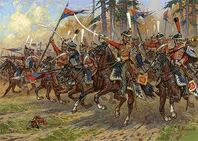
Kievan Rus'
fact, most of the ancient Russian rulers were Vikings themselves. The state of Kievan Rus is also known as Kievan Russia, loosely administered from Novgorod, which serves as the main precursor to modern Russia, Belarus and Ukraine, as well as their people and cultures. The names Russia and Belarus are derive from this civilization.
Many of the early East Slavic people were referred to as Russians. A Viking (also known as Varingian) prince known by the name of Oleg (Олег) moved the adminstration of the Rus' from Novgorod to Kiev and further united the people of Rus' into a collective kingdom. When Vladimir the Great (Russian: Влади́мир) came to the throne, Christianity replaced Paganism and would become the main religion of the Kievan Rus'. Vladimir is also known as "St. Vladimir" for spreading Christianity to the majority-Pagan Kievan Rus'. In 1019, Yaroslav I the Wise; following a victory over his rival Svyatopolk; took the throne of Kiev. Under his rule, the Kievan Rus' saw the height of its power. The Kievan Rus' eventually met its destruction and dissolution. through poor rulers and Mongol invasions.[9]
Grand Duchy of Moscow 1283-1547
One of the earliest precursor Russian states was the Grand Duchy of Moscow (Russian: Великое Княжество Московское, Velikoye Knyazhestvo Moskovskoye) or Grand Principality of Moscow, also known in English simply as Muscovy). This was a loose federation of Eastern Slavic states rule by princes.
Moscow and Eastern Europe had suffered from constant raids by the Mongol Golden Hoarde, therefore causing the Rus' to flee to forested areas of Moscow. Moscow was established as a protectorate trading territory of the Golden Horde.
Daniel I was the first Prince of Moscow, and his descendants, conquered nearby territories and married into Mongol royalty to enhance Moscow's power status.
In 1325, Ivan I, one of Daniel I's descendants, became Grand Duke of Moscow, and the close-knit relations with the Mongol rulers allowed him to control and conquer Moscow's rivalling state of Tver up north. Under the rule of Dmitry Donskoy from 1359 to 1363, Moscow began to challenge the surrounding city-states, from Tver, to the Golden Horde and the Muslim Tatars.
Dmitry also united the warring Russian states, to challenge the Golden Horde, defeating his own commander at the Battle of Kulikovo in 1380.
Under the rule of Vasily II, who was blind after torture at the hands of his enemies, Moscow was rocked by civil war and family fueding from 1425 to 1462. Under Vasily II's reign, the Russian Orthodox Church emerged as an independant church free of control from the Patriarch of Constantinople. In spite of extreme odds he faced, Vasily II still emerged victorious, and passed the throne to his son, Ivan III who would in Russian history, come to be known as "Ivan the Great".
Muscovite-Lithuanian Wars
Main Article: Muscovite–Lithuanian Wars
The Muscovite–Lithuanian Wars (also known as Russo-Lithuanian Wars, or just either Muscovite Wars or Lithuanian Wars) were a series of wars between the Grand Duchy of Lithuania, allied with the Kingdom of Poland, and the Grand Duchy of Moscow. After several defeats at the hands of Ivan III and Vasily III, the Lithuanians were increasingly reliant on Polish aid, which eventually became an important factor in the creation of the Polish–Lithuanian Commonwealth. Before the first series of wars in the 15th century the Grand Duchy of Lithuania had already gained control of a lot of Rus' territories, from Kiev to Mozhaisk, following its collapse after the Mongol invasions. Over the course of the series of wars, particularly in the 16th century, the Muscovites were able to expand their domain westwards, taking control of some of the lands that were once part of Kievan Rus.
Tsardom of Russia
The Tsardom of Russia also known as Tsardom of Muscovy,[10][11](Tsardom of Rus') or, in hellenized form, Российское царствo[12][13]) was the name of the centralized Russian state from Ivan IV's assumption of the title of Tsar in 1547 until Peter the Great's foundation of the Russian Empire in 1721.
From 1550 to 1700, Russia grew 35,000 km2 (about the size of the Netherlands) a year.[14] The period includes the upheavals of the transition from the Rurik to the Romanov dynasties, drawn-out military conflict with the Polish–Lithuanian Commonwealth as well as the Russian conquest of Siberia, leading up to the 42-year reign of Peter the Great, who ascended in 1682 and transformed the Tsardom into a major European power, after a military victory over Sweden and Poland implemented substantial reforms and proclaimed the Russian Empire (Российская Империя) in 1721, making it a recognized power in Europe.
Acquiring of Ukraine
Russia continued its territorial growth through the 17th century. In the south-west, it acquired eastern Ukraine, which had been under Polish-Lithuanian rule. The Zaporozhian Cossacks, warriors organized in military formations, lived in the frontier areas bordering Poland, the Crimean Tatar lands, and Russia. Although they had served in the Polish army as registered mercenaries, the Cossacks of the Zaporozhian Host remained fiercely independent and staged a number of rebellions against the Poles. In 1648, the peasants of Ukraine joined the Cossacks in rebellion during the Khmelnytsky Uprising, because of the social and religious oppression they suffered under Polish rule. Initially, Ukrainians were allied with Crimean Tatars, which had helped them to throw off Polish rule. Once the Poles convinced the Tartars to switch sides, the Ukrainians needed military help to maintain their position. In 1654 the Ukrainian leader, Bohdan Khmelnytsky, offered to ally Ukraine with the Russian tsar, Aleksey I. Aleksey's acceptance of this offer, which was ratified in the Treaty of Pereyaslav, led to a protracted war between Poland and Russia. The Truce of Andrusovo, which ended the war in 1667, split Ukraine along the Dnieper River, reuniting the western sector (or Right-bank Ukraine) with Poland and leaving the eastern sector (Left-bank Ukraine) as the Cossack Hetmanate, self-governing under the sovereignty of the tsar. However, the self-government did not last long and Eastern Ukraine was eventually fully incorporated into the Russian Empire
Conquest of Siberia
Main article: Russian conquest of Siberia
Russia's eastward expansion encountered little resistance. In 1581 the Stroganov merchant family, interested in fur trade, hired a Cossack leader, Yermak Timofeyevich, to lead an expedition into western Siberia. Yermak defeated the Khanate of Sibir and claimed the territories west of the Ob and Irtysh rivers for Russia.
From such bases as Mangazeya, merchants, traders, and explorers pushed eastward from the Ob River to the Yenisei River, then to the Lena River and to the coast of the Pacific Ocean. In 1648 Cossack Semyon Dezhnyov opened the passage between America and Asia. By the middle of the 17th century, Russians had reached the Amur River and the outskirts of the Chinese Empire.
After a period of conflict with the Qing Dynasty, Russia made peace with China in 1689. By the Treaty of Nerchinsk, Russia ceded its claims to the Amur Valley, but it gained access to the region east of Lake Baikal and the trade route to Beijing. Peace with China strengthened the initial breakthrough to the Pacific that had been made in the middle of the century.
Russian Empire 1721-1917
The Russian Empire was formed from the coalescing of Russian-speaking states and eastward expansion. Russian rulers adopted the title tsar (Russian: царь) which is Russian for the Latin word ceaser meaning emperor. Sometimes it is also spelled as czar which eventually became a common title for all Slavic Orthodox rulers, as a means of attempting to carry forth the legacy of the fallen Byzantine Empire. When the Russian Empire came the under the rule of Tsar Ivan III, or Ivan the Great, extended Russia's borders. Ivan the Great defeated the Mongol forces and overthrew its rule over Russia, giving it an independent status. He also conquered the city of Novgorod.[15] Ivan III's successor, Ivan IV or Ivan the Terrible; succeed him. Ivan IV was a ruthless tsar who destroyed all opposition and killed family members, including his own son as well as nullifying the power of the boyar class.
However, Ivan the Terrible reflected Ivan the Great and extended Russian territory, conquering the Turkic Khazar Kingdom.[16]
Peter the Great - Westernization
In 1862, the Russian Empire began another glorious age under the rule of Tsar Peter I, or Peter the Great, in which the Latin title Imperator (Император) was adopted for emperors of Russia. Peter I observed the history of Russia and sought to westernized it, followed by a desire to create a reminiscent of the Roman Empire. The empire saw a great renaissance and numerous building projects under Peter I, including the Winter Palace, one of Russia's greatest architectural features. He also worked to industrialized and urbanize Russia, he sent groups of workers into the hot and swampy areas of Russia and turned them into the great thriving city known as St. Petersburg or Petrograd.[17]
Peter the Great entered into an alliance of kingdoms against the Swedish Empire, an episide of European history known as the Great Northern War fought from 1700 to 1721, which saw the Tsardom accumalate large swaths of Northern European territory, namely Finland (its greatest acquisition), and in 1710, the Baltic provinces became absorbed in the Russian Empire. Although an Orthodox state, this now gave the Russian Empire a huge Lutheran population, and even incorporated the native Baltic German nobility as part of the broader nobilities under the service of the Emperor.
In 1726, Catherine the Great, born of impoverished German noble origin, became the Empress of Russia. She got into a high positions by marring Tsar Peter III, becoming Russian Orthodox as she was born Lutheran. The Russian people experienced another Golden Age under Catherine the Great, as her reign marked an age of Enlightmenment in the Empire, and further solidified Russia as a nation that embraced Western European influence. She also extended the Empire into the regions now comprising of Ukraine, Caucasus, Lithuania, Poland and Crimea.
It is at this point during the reign of Catherine the Great when German influence started to really shape Imperial Russian history. Russian languge became influenced by German, and Germans started to dominate the economy and even military elite of the Russian Empire.
Life for the average Russian however, the serfdom class remained unchanged, with the exception of a few rights, allowing those who accumlated wealth to buy their freedom, or file a complaint in the event of being illegally owned or mistreated. This however, was Catherine's ruse to keep the peasantry from revolting.
World War I & Russian Revolution 1914-1921
Despite losing to Japan, the Russians continued to rebuild their army - however, the embarrassing loss began to trigger enmity against the Tsar. In 1905, the First Russian Revolution commenced, waged by a mixture of peasants, seperatists, and Jewish labor groups, which would pave the way for the latter more-known revolutions. This First Revolution failed to overthrow the Tsar, but ultimately led to large-scale reform within the Russian government.
The Russian military continued to compete with those of the other European nations such as Britain, Germany and France who were the western powers. The Russians also signed a series of treaties and pacts with other Slavic nations such as Serbia and Bulgaria, although Russia's continuous courting with Serbia deteriorated its relations with Bulgaria. On June 28, 1914; a radical Bosnian Serb nationalist by the name of Gavrilo Princip murdered the Austro-Hungarian Archduke Franz Ferdinand and his wife during a speech in Sarajevo, which is the modern-day capital of Bosnia and Herzegovina. This caused the Austro-Hungarian army to declare war on Serbia.[18] Since Serbia was an ally and protectorate of Russia, Tsar Nicholas II retaliated and declared war against Austria-Hungary, who was an ally and protectorate of Germany who then declared war on Russia. The Russians eventually entered World War I on the side of western allies, but still failed to achieve a victory against the Germans (both empires collapsed at war's end). In addition, Russia was concurrently suffering a fledling civil war that only made the situation worse.
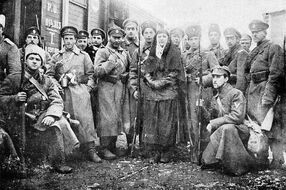
White Army militia in southern Russia, 1918
In 1917, with a defeated Russian nation fed up with Tsar Nicholas II, the February Revolution ousted Nicholas II and his family out of power,

Red Army Militia
which established a short-lived democratic and provisional government, in which the former Russian Empire was turned into the Russian Republic.[19] It was dominated mainly by a liberal faction known as the Kadets and the left-wing Socialist Revolutionaries. Within the Russian Republic, two predominant groups emerged, namely far-leftist groups, who were often referred to as the Reds, due to the red flags and red banners they carried, which later became the "Red Army". The largest faction, of which was led by Vladimir Lenin, known as the Bolsheviks. The far-leftist camp was heavily Jewish-led and influenced. In addition, there were also seperatists, anarchist "Green" and "Black Armies".
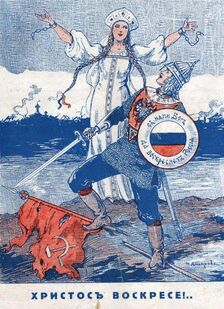
A 1932, post-civil war White Russian propaganda poster
Opposing the Red Army was the White Movement" or the "White Army". They consisted of a mix of provisional government supporters, religious leaders, nationalists, liberals, monarchists and anti-Bolshevist socialists, with the only mutual goal of fighting the communists. Although both sides faced internal factionalizing, the Whites suffered more from it which played a key role in their downfall. For example, Alexander Kolchak, a Russian naval veteran advocated for a republic, while leaders such as Pyotr Wrangel of South Russia, a noble and a baron, advocated for a monarchy. Both the Reds and Whites utilized veterans from the Imperial Russian military and would eventually clash in what is known as the Russian Civil War, to which ended up in a Bolshevik victory thanks to the divided nature of the White Army, Bolshevik domination of the leftist camp, and the Bolsheviks' recognition of Poland and Finnish independence. with the Bolsheviks solidifying their hold in 1921.
White Emigres
Many White Russians fled from the new communist nation en masse. Western Europe, Germany, the United States, France, China, Shanghai and the Balkan nations recieved the heaviest concentration of these. The remaining Romanovs, particularly Grand Duke Kiril I Vladimirovich's faction, migrated to France and Germany. Many made new careers in their new host nations, never to return to Russia while others made attempts to re-migrate to their Russian homeland. Others would join the fascist and Nazi movements decades later. They became known as the "White émigrés", and formed entire organization and even military formations, such as the All-Russian Military Union formed in Yugoslavia by Pyotr Wrangel.
Decades later, in the 1940s when the Moscow Patriarchate made concessions to Stalin and the Bolsheviks for state approval, the Russian Orthodox Church Outside Russia (Ру́сская Правосла́вная Це́рковь Заграни́цей) was formed due to émigré opposition against the Moscow Patriarchate's support of the Soviets.
It is also to note that the White Emigres were not all ethnically Russian, but as also many Baltic Germans, Central Asians, Mongols and Caucasians who were loyal to the Russian state and opposed communism. Pyotr Wrangel for example, was a Baltic German.
Red Terror, Russian SFSR 1921-1922
The early Soviet Union was not as solidified, but a coalition of closely-aligned Marxist states, to which the Russian Soviet Federative Socialist Republic, or the Russian SFSR, emerged as the largest state. This would cover the territory of the former Russian Empire inhabited prodominantly by ethnic Russians, though it still had many non-ethnic Russian autonomous enclaves. Only a few years after the Bolshevik victory did the Soviet Union solidify into a single nation.
In the Russian SFSR, the Red Terror would soon follow, in which Russian culture, as it was pre-1921, took a heavy hit. Many literary works, due to being nationalist, or religious in nature (known to the Bolsheviks as "counter-revolutionary" material), perished in the Red Terror. A new Russian Soviet culture would come to take its place for many decades soon to follow, as Moscow transitioned from a haven of Orthodox culture, to a haven of communist and atheist culture.
Vladimir Lenin would, in the decades following be a symbol of communist revolution, revered even by communist and socialist nations that did not pursue, or even outright opposed Soviet policy.
Joseph Stalin and Leon Trotsky engaged in an internal struggle of who should become leader of the Soviet Union.
Stalinist Era 1924-1953

Destruction of the original Christ the Savior Cathedral in 1931
Following Lenin's death, the Soviet Union fell under the leadership of Joseph Stalin from the Georgian SSR, after defeating his Jewish rival Leon Trotsky (who favored global socialism as opposed to Stalin's "socialism for one country"), subsequently having him murdered while in Mexico. Stalin was a native of the Georgian SSR and not an ethnic Russian.
The unfortunately reality for the Russian people was their overthrow of the Tsar had only led into an era more oppressive. Stalin's Great Terror came at the cost of 62 million lives (mostly ethnic Ukrainians) under his order.[20] Stalin also continued many aspects of the Red Terror, including more demolitions of Russian Orthodox Churches and more killings suspected Russian nationalists. Stalin also worked to rebuild the Soviet military and enforced harsh industrial policies, via his "Five-Year Plans" resulting in great expansion of the Red Army. Stalin's rule also took a toll on the rural populations, where Stalin enacted a policy known as collectivization, in which farmers were forced to sell their produce and livestock for a lot less than their true worth.
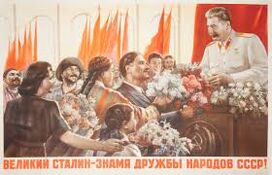
A Stalinist propaganda poster
Stalin also invaded smaller countries to enforce military domination in eastern Europe and even Asia having defeated China in 1929.
In the following years, the Soviets would extend their influence in Eastern Europe and Central Asia - and even East Asia, supporting the Kuomintang in China against Japanese-supported warlords, concerning many of the western leaders. The Soviets funded communist paramilitary groups in other countries to help establish Marxist governments in those nations. During the 1930s, the
The Soviet sphere of influence was challenged by the rise of Fascism, started in Italy and popularized in Germany by Adolf Hitler as a reactionary movements against communism. Many White emigres in Germany sided with the Nazi regime, seeing it as a vanguard against communism.
Thus, the 1930s the begin the first "Cold War", between Soviet-backed communists and German-backed Fascists. The Soviets and German spheres of influence indirectly collided in the Spanish Civil War, which was won by Fascist forces.
In 1939, the two socialist states finally met in Poland, where it was divided between a Soviet-controlled eastern Poland and a German-controlled western Poland, leading to the signing of the infamous Molotov-Ribbentrop Pact between Soviet foreign minister Vyacheslav Molotov and his German counterpart, Joachim von Ribbentrop.
In 1939, the Soviets invaded Finland, though failed to dominate Finland but was able to gain Karelia. That same year, Mongolia was fighting an independence war against Japan. The Soviets helped the Mongolians fight Japan, and defeated Japan that year, winning Mongolia as a protectorate territory. The Soviets also defeated Japanese forces in Manchuria. After these victories, the western nations officially felt threatened by the power of the Soviets, a phenomenon known as the "Red Scare".
Stalin also led one of the greatest political terrors of the 1930s, known as the Great Purges, in which he murdered political opponents, mostly "Old Bolsheviks" out of sheer paranoia. Many high-ranking intellectuals within the Red Army and Communist Party perished during this era, which would ecome to bite back when the Germans began their invasion of the Soviet Union in 1941.
World War II 1941-1945
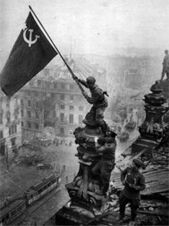
Soviets raising their flag atop the destroyed Reichstag in Berlin
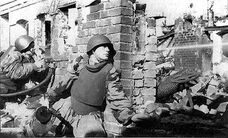
Soviet troops firing flamethrowers during Stalingrad battle
Slavs were also into the list of Hitler's group of races targete for extermination, with the goal of resettling the conquered territories of Eastern and Southern Europe with Germans after killing off the Slavic population. Hitler invaded the Soviet Union in 1941, beginning with the Soviet-held portion of Poland (previously partitioned between the two in 1939).
Most of the Soviet Union's means of production were located in the West, to whhich, included the Russian SFSR, forcing many Russian workers to sacrifice their living and housing conditions.
Thus, millions of ethnic Russians (as well as other Slavs) would suffer another vicious round of torture and execution via the Holocaust as the early phases of the German invasion phared disastrously for the Soviet defenders. At this point in the war, Stalin began to re-incorporate elements of Russian nationalism and patriotism back into domestic policy, including the re-introduction of Eastern Orthodox culture and blessing of arms. Many Soviet troops were captured by the German invaders, and sent to POW camps to undergo torture. Millions of Russians endured through starvation, either in prison camps or during German sieges, and were known for their total disregard for high casualities. Many Russian civilians were used as human shields, or joined paramilitaries. The Soviet Union however, treated women as equals, and women contribute to the war efforts on the battlefield, as much as men, entire military and paramilitary formations were composed of women. Unfortunately, even children were used as soldiers.[21]
In addition, out of hatred for the Soviet system, many Russian defectors from the Red Army and White emigres ended up joining the German side, as puppet leaders, in hopes of overthrowing the Bolshevik regime. They would be part of a German puppet army known as the Russian Liberation Army (Russian: Русская Освободительная Армия, German: Russische Befreiungsarmee), using German equipment. Others included the First Russian National Army, the Russian National People's Army among others. With the defeat of the Axis at Stalingrad, the Soviets repulsed the invasion all the way into the heart of the Reich, Berlin, resulting in the capitulation of Nazi Germany, and stopping the possible extinction of the Russian peoples. The Soviet Union sustained almost 26 million casualities, although this accounts for all Soviet citizens irregardless of ethnicity, therefore including also non-ethnic Russians.[22]
Cold War 1946-1992
Political/Military/Technological Competition

Soviet nukes on display during a military parade in Moscow
The Soviet Union grew out of the ruins of World War II as a superpower, to counter the United States, becoming at one point, the only nation outside the United States to posses nuclear weapons.
However, for the average Russian, life inside the Soviet Union in the aftermath of World War II was one of struggle, as Stalin put much greater emphasis on retaining on retaining the Soviet Union's image as a global power to counter the West.
The quality of life for a Soviet citizen was sub-par, and the Russian people suffered bouts of alcoholism, and diseases such as typhoid, measles and sub-par cancer detection. Getting access to goods also involved long lines, and frequent supply shortages as part of the command state economy.[23] However, Soviet policy also put a huge emphasis on eliminating illteracy, where the Russian people experienced access to free education. One of the biggest features of the living conditions for the average Soviet citizen was the communal apartment, as large-spacious apartments were regarded as elitist and capitalist.[24]
On the broader and global stage, the Soviet Union established itself as a bastion of communism and Russian glory at the same time, the political nature of the CPSU had drastically changed, one that unlike that of the early post-World War I era, was marked by a return of Russian nationalism, patriotism and pan-Slavism (though through a communist filter). Thus, the post-World War II era would create a distinct Soviet-Russian patriotism and nationalism. Non-Russians, let alone non-Slavs, were severly discriminated against in the Soviet Union.
The Soviet Union poised to make itself the leader of the communist bloc. This caused rifts within the communist bloc, due to doctrinal differences led to the Soviet Union breaking ties with Yugoslavia in 1948 and China in 1956, despite having courted with the two in the early days after World War II. Similar rifts occurred with Czechoslovakia in 1968.
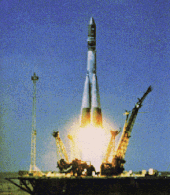
Launching of Vostok 1 from Biakonour Cosmodrome, in the Kazakh SSR (today Kazakhstan)
In 1949, the Soviets tested their own atomic bomb which was a success, becoming the second nation from the United States to possess nuclear weapons, persuading both sides to avoid direct confrontations. In the decades to come, the Soviets possessed ground and nuclear supremacy, the United States enjoyed naval and aerial supremacy, as well as stronger allies. The Soviet Union and United States stood as the two world lone powers (China was arguably a third lone power as well), competing against one another through proxy wars instead of a direct confrontation known as a "hot war" - using other nations to do their biddings.

Sputnik 1, the first space satellite
Nikita Kruschev's decision to open ties to the west infuriated Mao Zedong of China, who considered himself a true communist, and Krushchev's policies to be anti-communist as Kruschev himself was also an anti-Stalinist which Mao saw as an attack against communism. Kruschev was known for relaxing policies against farmers, and un-doing collectivization. He also allowed decentralizations of Soviet industry.[25] This led to the Sino-Soviet Split of 1956. This led to China entering the Cold War as a third player, also funding and supporting overseas regimes to combat both the Western and Soviet blocs.
As the Cold War progressed, the Soviet Union contained the largest modern military force, both in terms of conventional or nuclear weapons. The Soviet Union was able to make scientific breakthroughts in the history of space exploraton. In 1957, the Soviets launched the first space satellite, Sputnik 1. Sputnik 2 followed that same year, launching a dog by the name of Laika, to be the first living animal sent into outer space.
In 1961, the Soviets launched the first human, Yuri Gagarin into outer space via the Vostok 1 spacecraft. However, the United States ended up becoming the first to send a man to the moon with Neil Armstrong via the Apollo 11 space mission.
Cultural Competition With the West
The Soviet Union and United States became national rivals but only did both compete in military strength, but also in many sports events as the Soviet Union as considered a sports-empire. Although a mult-ethnic empire, large number of memorable Russian athletes rose to global stardom thanks to the patriotic push to become the world superpower. Lev Yashin (1929-1990) is considered the best goal-tender in the sport of football (soccer), Vledislav Tretriak is considered the best goaltender in ice hockey, and contributed to the Soviet Union's near juggernaut ice hockey-success during the Cold War. In 1980, the a boycott was led against the Olympic games which were supposed to be held in Moscow.
Fate of the Russian Emigres in the West
The Cold War had negative implications for Russian emigres living in the West, many were suspected of being communists or covert Soviet agents. Russians and Russian culture at this point in history became intertwined with communism and Bolshevism. In 1973, this led to the formation of Congress of Russian Americans.
On another whim, many Russians served as defectors to the West, which included people like Anatoliy Golitsyn, former KGB member who also belongs to the noble House of Golytsin. In the United States and Canada, the fate of the Russian diaspora is mixed, with communities keeping their culture, others assimilating into the broader American and Canadian cultures.
Many Russians also ended up becoming successful and well-integrated in the societies and elite of their host nations. Igor Sikorsky's inventions are now part of American aerial engineering history, and the aircraft corporation bears his name. Other examples of famous Russian-Americans would be Hollywood star Natalie Wood, born as Natalya Zacharenko as well as Milla Jovovich who is partial Russian descent through her mother and still speaks fluent Russian, or Nastia Liukin, Soviet-born who represtented the United States in the Olympics for artistic gymnastics (although her migration to the United States was after the Soviet collapse). In the case of Canada, Ivan Babikov, cross-country skier who represents Canada.
Post-Cold War Era 1991-present
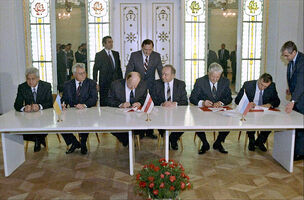
Signing of the Belavezha Accords, between the leaders of the former Russian SFSR (today Russia), Ukainian SSR (today Ukraine) and the Belarusian SSR (today Belarus), December 8, 1991
In the 1980s, Soviet power began to weaken, due to flaws in its leadership, in that most Soviet leaders were aging war veterans. The oil inflation damaged the Soviet Union's oil industry and the policies of Ronald Raegan'e economics further helped foment the collapse of communism in Eastern Europe. In the late 1980s, anti-communist revolutions raged Eastern Europe, overthrowing pro-Soviet governments one by one.
As communist governments in Eastern Europe fell, the Soviet Union was left in severe isolation. China, despite being communist, had cemented close ties with the West. Mikhail Gorbachev's perestroika and glasnost policies of openness and freedoms of the press and media only helped spearhead the coming catastrophe for the Soviet Union. The Russian people would experience large-scale political and economic turmoil.
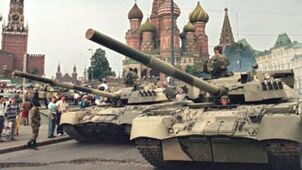
Soviet tanks in Red Square during the 1991 Coup Attempt
By 1991, most of the republics of the Soviet Union ignored any political legitimacy from Moscow and had begun to enact their own political policies and systems. On August 19, 1991, hardliner communists attempted to overthrow Mikhail Gorbachev for his openness policies, a coup that failed.
On December 8, 1991, the leaders of the Soviet Union's three main Slavic republics - namely Russia, Belarus and Ukraine, signed the Belavezha Accords, effectively ending the Soviet Union. On Christmas, December 25, 1991 (in accords to Moscow time), the Soviet flag was lowered for the last time atop the Kremlin, and replaced with the tri-color for the pre-1922 revolution.
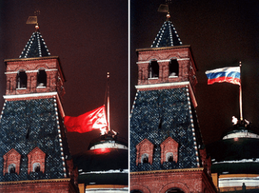
The Soviet flag being lowered for the last time (left), and replaced with the pre-Soviet Russian tsarist tricolor (right), Moscow 1991
Russian Federation 1991-present
The Russian Federation, of the former Russian SFSR, was considered the legal successor state to the Soviet Union, and held all of the Soviet Union's obligations. Boris Yeltsin would be Russia's first president in the post-Cold War era. As such, the Russian Federation inherited the largest bulk of the former Soviet military.
The Russian Federation attempted to keep a quasi-Soviet influence over the former Soviet Union by creating the Commonwealth of Independent States, a bloc that ended up to be a failure and for the majority of the 21st-century, the Russian Federation would fail to recover the global influence that the Soviet Union of old had. Russian soldiers withdrew from most former Soviet and Warsaw Pact territory, save for Crimea, Tajikistan and Armenia, retaining a presence in those countries.
Sadly, life for the average Russian inside the country did not change for the batter, and only for the worse in the face of the sudden regime change. In the years following, Russia suffered a Constitutional Crisis in 1993 after ultra-nationalists, a mix of far-right tsarists and far-left Bolsheviks collided with the Yeltsin government, followed by a financial crisis in 1998. The Russians also fought two devastating Chechen Wars against Chechen seperatists, barely emerging victorious. In this instance, Russia transitioned from a superpower (as the Soviet Union) into a near rump-state, marked by massive inflation, the rise of oligarchic and mafia rule, as well as rampant anarchy, crime and corruption.
Russian military spending fell to $10 billion or less. Life in all of the former Soviet Union reflected these disasters (with the exception of the Baltic states, who joined NATO and the European Union, seeing drastic improvements in their quality of life).
The collapse of the Soviet Union had fomented the United States' status as the sole global superpower, rivalled only by China. Thus, many more Russians began to migrate to the West in search of better fortunes, as the transition from a Marxist-Leninist economy to a capital economy created a shock-therapy for the peoples of Russia. Many went to go join the technology industry, resulting in the "brain drain" phenomena.
Fate of Russians Outside the former Russian SFSR/Russian Federation
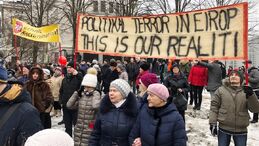
Ethnic Russians in Latvia protesting anti-Russian laws, 2018
After the collapse of the Soviet Union, many Russian communities remained in the former Soviet republics that weren't ethnically Russian, namely Kazakhstan, Uzbekistan, Estonia, Belarus, Krygyzstan and the Baltic nations of Latvia, Estonia and Lithuania. Their fate truly depends on what nation.

Alexander Nevsky Cathedral in Tallinn, Estonia
In Belarus and Kazakhstan, life for the Russian diaspora remained indifferent, as these two nations continued to have close-knit relations with the Russian Federation. In Ukraine and especially the Baltic nations however, such as Estonia and Latvia, the Russians living in those nations faced discrimination, as they are considered non-natives, non-citizens and were subject to naturalization requirements and assimilationist attempts. They remained stateless people. In 2011, it was estimated that 51% of Russians in Estonia were un-integrated.[26] They live mostly in Estonia's southern regions.
Within Latvia, the Latvian-Russian diaspora formed social and political organizations, such as the Lativan-Russian Union, and the Harmony Party.
Within Ukraine, the relations are rather cyclical, and interethnic relations between Russians and Ukrainians truly depended on the region, time-period and the political nature. After Ukraine gained independence from the Soviet Union, relations between ethnic Ukrainians and ethnic Russians were not negatively effected, and in 2009, the majority of Ukrainians stated positive views of ethnic Russians.[27] This is most true for the easter and southern regions, where many ethnic Russians live, though still a minority. However, the results are drastically different in western Ukraine, considered the true homebase for Ukrainian culture, where the majority held negative views.[28] Relations between the two took another huge dip after the events of 2014, in which the majority of Ukrainians held cold views towards Russia, though this doesn't account for ethnic Russians themselves.[29] However this did take a toll on the relations between Russians in Ukraine and ethnic Ukrainians.
Some political parties, such as Svoboda and the Right Sector, as well as many ultranationalist and neo-fascist organizations also hold anti-Russian sentiments, placing Russians in the same category as Bolsheviks and Jews. Still, Russian cultural influence remains strong in Ukraine.
Russian seperatism in Ukraine 2014-present
Many of the leaders within the predominantly ethnic-Russian enclaves in east and southern Ukraine, declared independence from Ukraine, forming severaly partially-recognized seperatist republics, namely the Donetsk People's Republic (Russian: Донецкая Народная Республика) and the Luhansk People's Republic (Russian: Луга́нская Наро́дная Респу́блика). Although the Russian government claims it does not provide arms and support, but there is evidence otherwise. Leaders of the two have considered uniting the two into a Novorossiya (Russian: Новороссия), literally meaning "New Russia".
Post-Cold War Russian migration to the United States
The financial mess caused by shock-therapy, as well as the frustration against the former Soviet government led to a surge of Russian engineers and scientists migrating to the United States, where it became estimated as much as 30% of Microsoft's products were from the work of Russian immigrants in 2002.[30] Many also became university professors, where they form a high contrast against American-born natives.
Recovery and Return to Global Prominence 2008-present
The twenty first century under the duo of Vladimir Putin and Dmitry Medvedev saw a steady rise back to the global scene, but it was truly felt under the presidency of Dmitry Medvedev, who reigned as presidnet of the Russian Federation from 2008 to 2012. The Medvedev presidency saw huge modernization and progress of Russian economy and society, as well as friendly relations between Russia and the West, only to once-again, take a dip beginning in 2014, two years into the presidency of his successor and predecessor, Vladimir Putin who drawn mixed perceptions - but evidently is leading an autocratic rule in Russia.

Russian forces in Georgia, Russo-Georgian War 2008
In 2008, Russia performed its first overseas military operation in the Russo-Georgian War, annexing South Ossetia and Abkhazia in nothern Georgia. In 2014, Russia sent military forces into Crimea under the support of pro-Russian rebels. While the West sees it as an illegal annexation, Russia argues that Crimea belonged to them in the first place. In 2015-2016, Russia was actively involved in the Syrian Civil War, helping Bashar al-Assad's regime against rebels and ISIS. In 2017, Russia and Syria agreed to continue Russian military presence in the naval base of Tartus, one of the Russian Federation's few overseas bases.
Still, even in the post-Cold War era, Russia's relations with the West have been hostile, with Russia often supporting opposing regimes to those supported by the Western powers. American Democrats blame Russia for hacking and interfering in the 2016 United States Federal Presidential Elections. A number of cyber incidents have also been attributed to Russia. Russia has also been accused of attacking ex-Soviet spy Sergei Skripal and his daughter Yulia Skripal in Australia with nerve gas. As a result, this had led a negative implication of Russians in the West once-more, as being spies for Vladimir Putin. The mainline opposition against Vladimir Putin is being led by civil activist Alexei Navalny.
2022 Russian invasion of Ukraine
On February 24, 2022, as a response to the Ukrainian government's refusal to recognize Donetsk and Luhansk as independent, the Russians invaded Ukraine under order of Vladimir Putin. As a result of the on-going Russo-Ukrainian war, the Russian people (including those outside Russia) would face upheavals of political origin. Within Russia, ethnic Russians were subject to nationalist propaganda proclaiming that the war was about "liberation of Ukraine". Outside of Russia, their culture fell under attack, with Russian-owned businesses being victim of vandalizations, threats and attacks. However, some Russian groups in Ukraine such as the Russian Volunteer Corps and the Freedom of Russia Legion were formed to oppose Putin and his war against Ukraine, forming some of balanced relations between ethnic Russians and their non-Russian counterparts.
At this point, Russian culture in Ukraine recieved the final nail on the coffin, as Ukrainian president Volodymyr Zelensky approved a new law changing any Russian-related place names.
In addition, with the "coup attempt" by Wagner, a private paramilitary initially loyal to Putin, the future of the ethnic Russians inside Russia are quite dire, as they the face the threat of a second civil war.
Language

he Russian language is a world major language and is spoken by 258,000,000 people either as a native or second language. Russian is a direct descendant of the Old East Slavic language. The Russian language is still spoken by minority Russian communities in former Imperial Russian and Soviet states such as Lithuania, Ukraine, Estonia, Poland and Romania; and also contains communities of speakers in Israel, United States and Canada. Russian is spoken as the national language of Russia and Belarus and a co-official language in Belarus, Kazakhstan and Kyrgyzstan which are all former Soviet states. It is spoken as a minority in Central Asian republics that no longer declare Russian as an official language, such as Uzbekistan and Azerbaijan. It is the most spoken non-official language in Israel, which contains the world's third largest Russian-speaking population outside of the former Soviet Union. Although no longer official or government-recognized in Ukraine as a result of the events of 2014 and 2022, it is still widely-spoken in Ukraine. Belarussian, Ukrainian and Rusyn are related languages to

A Russian bookstore in the Israeli city of Arad
Russian as they are also East Slavic languages. Church Slavonic is the liturgical language for the Eastern Orthodox Church (see religon below). Church Slavonic is also used in other Slavic countries as well that are followers of eastern sections of the Orthodox Church. The Cyrillic alphabet is used to write the Russian and Church Slavonic languages. The Cyrillic script itself had been a different dialect-script of Greek and originated in Bulgaria. The script was perfected by Greek linguists and religious leaders, St. Cyril and Methodius which became Russia and many other Slavic states' official scripts.
Religion

St. Basil's Cathedral
Most Russians are followers of the Russian Orthodox Church, with also large numbersof atheists and agnostics. This is governed by the Patriarch of Moscow. For long, the Eastern Orthodox Church has been deeply embedded into East Slavic culture, creating somewhat of an ethno-religious identity. Prior to the October Revolution led by Vladimir Lenin, Russia was at one point, consiered a haven of Eastern Orthodoxy, and many looked to Russia as a protector of Orthodox Christians, and the successor to the Byzantine Empire.
After the emigration of White Russians from Russia proper during the communist regime, the Russian Orthodox Church has found itself in many parts of the world, as White Russian refugees formed communities all over the world. The Russian Orthodox Outside Russia (Russian: Ру́сская Правосла́вная Це́рковь Заграни́цей), is a section that traditionally rejects the authority of the Patriarch of Moscow, due to the former's allegiance to the Bolsheviks during the Soviet era. New York City, home to one of the largest Russian-American population, is the city of jurisdiction for the Russian Orthodox Church Outside Russia. In addition, Russian Orthodox can also be found in many countries of the former Soviet Union, however they are under the jurisdiction of the Patriarch of Moscow.
The Greek and Cyrillic scripts function as liturgical scripts for certain Orthodox sections. When Orthodox Christianity was introduced to the Slavic people by St. Vladimir the Great; domes became part of Russian architecture. This is an influence that shows Greek-Byzantine origin. St. Basil's Cathedral in Moscow is a perfect example. This cathedral is a famous landmark in Moscow, the snowy capital of Russia and a world UNESCO site. The colored onion domes atop the cathedral reflect the glorious imperial history of Russia. During the Soviet era, Atheism crept its way into Russian culture, as the Soviet authorities often tried to suppress Orthodox culture, and all religion in general. As a result, many Russians are also atheists and agnostics.
Cuisine
The cuisine of Russian evolved from several historical periods of the country. A lot of the cuisine can be traced back

Pelmeni, Russian dumplings
to early peasants who had to survive the brutal Russian winters, who passed on their traditions. There are also Mongol and Turkic influences in Russian cuisine. In addition, staple ingredients include fish, game (meat that is hunted and not bought), mushrooms, honey as well as berries. Meat and game is boiled for long periods of time. Wheat, rye and barley provide dishes such as breads, pancakes, cereals. Staple beverages include milk, beer and vodka. Kvass is a sour milk that is used to make a cold soup known as okroskha (Russian: окрошка) in the summer time. Sour cream is also used to top okroshkha. There is also a dumpling known as pelmeni (Russian: пельме́ни). Pelmeni originated from Siberia, brought over by Mongol tribes. Pelmeni is much more similar to Mongolian buuz
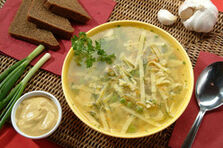
chicken lapsha
dumplings that it is with Chinese gyoza dumplings. Despite its Mongol-origin, pelmeni is popular throughout all of Eastern Europe as well, specifically Belarus. Medovukha (Russian: Медовуха) is an alcoholic drink made with fermented-honey, also fairly original to Lithuania. This is a beverage that has existed for millenia in Russian and Lithuanian history. Medovukha's alcohol content tends to be generally low. Vodka (Russian: водка) is a distilled alcoholic drink that also originated in Belarus as well. Vodka only contains very few hints of flavoring and is known to be dangerously strong for many consumers. Consequently, vodka is drunken in very small glasses known as "shots". This is a beverage that is no longer confined to Slavic countries and can be found in stores all over the world.
Famous Russians or People of Russian Origin
Religious figures
|
Sergius of Radonezh |
Saint of the Russian Orthodox Church, who is infamous for leaving his material life to go live and lead a monastic life, he is one of the most venerated saints in the Russian Orthodox Church. |
|
Seraphim of Sarov |
Saint of the Russian Orthodox Church, who is also famous for spreading monasticism to the regular people, he is not only venerated in the Eastern Orthodox Church, but also Eastern Catholic and Anglican Communion, he is considered one of the greatest elders of the 18th century. |
|
Alexander Nevsky |
Saint of the Russian Orthodox Church as proclaimed by Macarius, the metropolitan of Macarius in 1547, Prince of Novgorod and Grand Prince of Kiev and Vladimir who led his kingdom through some tribulations, he is known for his legendary military victories against German, Swedish and Mongol invaders |
| John of Kronstadt Иоа́нн Кроншта́дтский |
Russian Orthodox archpriest, and member of the Most Holy Synod, who was known for providing outcasts with spiritual hope. Known as the "Father of Kronstadt", he drew upon large groups of admirers, and even laid to rest Tsar Alexander III, and even viewed spiritual and national enemies with compassion in spite of his right-wing and conservative views, he became canonized a saint in the Eastern Orthodox Church. |
| Grigori Rasputin Григорий Распутин |
A Russian mystic who claimed to have supernatural powers, and held extensive influence over the Russian Empire - especially Czar Nicholas II and his family, people in the court had mixed opinions about him, some seeing him as an important prophet while others saw him as a religious fraud, he lost his fame and creditability as the Imperial Russian Army began losing battles in World War I |
| Matrona of Moscow Матрона Московская |
A canonized saint of the Russian Orthodox Church, her spiritual achievements were thought to have been prophecy, and spiritual visions, she was also famous for providing comfort, healing and hope towards Orthodox Christians during the Soviet period, when religious practices were stigmatized, even outlawed publicly. She is one of Russia's most famous "folk saints". |
Rulers, Politicians, Heads of State
| Ivan III Иван III | Also better known by "Ivan the Great", the Grand Prince of Moscow, and all of Rus', he is renowned for uniting the Rus', ending the Mongol rule over the its lands - in a sense, turning the Rus' from a confederation of Eastern Slavic peoples into an empire, he is considered one of the longest Russian rulers. |
| Ivan IV Иван IV | Also better known by "Ivan the Terrible" and "Ivan the Fearsom", Grand Prince of Moscow from 1533 to 1547 and Tsar of "All of the Russias" from 1547 to 1584. He is known for his expansionist policies, and the various Russian conquests of Central Asia and Siberia, turning the Russian Empire into a multi-ethnic empire. His moniker "Ivan the Terrible" comes from his periods of mental instability, killing his own son, Feodor Ivanovich. |
| Peter the Great Пётр Вели́кий |
Russian monarch, ruler of the Tsardom of Russia and first ruler of the Russian Empire, he transformed Russia into a major European power, and was responsible for continuing Catherine the Great's modernization and westernization of Russia, his basis of transforming Russia was based on the Enlightenment, the city of St. Petersburg (temporarily renamed Leningrad during the Soviet era) is named after him. |
| Elizabeth of Russia Елизаве́та Петро́вна |
Russian monarch, Empress of Russia from 1741 to 1762. The daughter of Peter the Great and Catherine I, Elizabeth continued her father's policies of construction projects and urbanizing the Empire, however what made her truly one of the most popular Russian monarchs was her Enlightenment ideas, and her opposition to capital punishment, during her reign, the Russian courts were considered one of the most splendid of Europe. |
| Alexander II of Russia
Алекса́ндр II Никола́евич |
Also known by "Alexander the Liberator", Emperor of Russia from 1855 to 1881, he is most well-known for a number of liberal reforms in the Russian Empire, most notabely his emancipation of the serfs, promotiong of local self-government, and university education. In addition, he also sold Alaska to the United States, and entered the Russian Empire into a political league with the German and Austrian Empires. He also continued the Russo-Ottoman wars, leading the Russian Empire into the 1877-1878 war that led to the independence of Serbia, Bulgaria Romania nad Montenegro from the Ottoman Empire and also encourage Finnish cultural autonomy. |
| Vyacheslav Molotov Вячесла́в Мо́лотов |
A Soviet politician and diplomat who rose to power as a result of Joseph Stalin's rule, he was the Chairman of the Council of People's Commissars from 1930 to 1941, Minister of Foreign Affairs from 1939 to 1941 and again from 1953 to 1956, serving as the First Deputy Premier from 1942 to 1957. He was the main signatory of the German-Soviet Nonaggression Pact, also known as the "Molotov-Ribbentrop Pact" due to the involvement of his German counterpart Joachim von Ribbentrop. |
|
Nikita Kruschev |
Soviet premier who heightened the Cold War drama between the Soviet Union and the United States, he was also an amid anti-Stalinist and was responsible for the partial de-Stalinization of the Soviet Union, for backing the progress of the early Soviet space program, and for several relatively liberal reforms in areas of domestic policy. |
|
Mikhail Gorbachev Михаи́л Горбачёв |
The last leader of the Soviet Union, who is most infamously-known for implementing the liberalizing reforms known as perestroika and glasnost. Alongside East Germany's Egon Krenz and Poland's Wojciech Jaruzelski, Gorbachev was one of the last surviving leaders of an Eastern Bloc state as of 2014 until his death in 2022. |
| Vladimir Putin Влади́мир Пу́тин |
Russian politician who has been the head of state for most of Russia's post-Soviet era, interchanging between president and prime minister, succeeded Boris Yeltsin, during his first run as president, the Russian economy and military saw major improvements and growth. Because of his political career, influence and popularity in Russia, he is known as one of the world's most powerful leaders. In 2007, Time Magazine named him Person of the Year. He was ranked as the World's Most Powerful Individual by Forbes from three consecutive years from 2013 to 2016. Despite taking a "president" position, he has been known for his autocratic and oppressive rule which has dictated most of modern Russian history. |
Artists, Authors & Poets
| Modest Mussorgsky Модест Мусоргский |
A Russian composer, one of the group known as "The Five". He was an innovator of Russian music in the romantic period. He strove to achieve a uniquely Russian musical identity, often in deliberate defiance of the established conventions of Western music. |
| Anna Akhmatova Анна Ахматова |
A Russian modernist poet, one of the most acclaimed writers in the Russian canon. Her work ranges from short lyric poems to intricately structured cycles, such as Requiem (1935–40), her tragic masterpiece about the Stalinist terror. Her style, characterized by its economy and emotional restraint, was strikingly original and distinctive to her contemporaries. The strong and clear leading female voice struck a new chord in Russian poetry. |
|
Alexander Pushkin |
A poet from the Romantic era, considered the greatest Russian poet and considered to be the founder of modern Russian literature, he is famous for his play Boris Gudonov |
|
Anton Chekov |
Russian polymath, physician and author who is renowned as one of the greatest dramatic authors in history, he is also considered one of the greatest short-story writer, Chekhov had at first written stories only for financial gain, but as his artistic ambition grew, he made formal innovations which have influenced the evolution of the modern short story. |
|
Pyotr Tchaikovsky Пётр Чайко́вский |
Russian Romantic composer, and one of the first Russian composers to have influenced internationally, re-uniting native and Western European musical styles, part "The Five" of Russian musical history but he is most famous for writing one of the scores for the famous Christmas ballet The Nutcracker |
| Anna Pavlova Анна Павлова |
A Russian prima ballerina of the late 19th and the early 20th centuries. She was a principal artist of the Imperial Russian Ballet and the Ballets Russes of Sergei Diaghilev. Pavlova is most recognized for the creation of the role The Dying Swan and, with her own company, became the first ballerina to tour ballet around the world. |
|
Leo Tolstoy |
Russian author and noble bearing the title Count, who was famous for his novels and short stories, his best known works include War and Peace and Anna Karenina, he also became a prominent Christian anarchist and his writings had influenced promient people such as the Indian independance figure Mohandas Ghandi and the African American activist Martin Luther King Jr. |
| Fyodor Dostoevsky Фёдор Достоевский |
A Russian novelist, short story writer, essayist, journalist and philosapher, who is most famous for writing works that explore the nature of human greed and corruption in philosophical and religious themes, and published books banned in Tsarist Russia (getting imprisoned as a result), he started by writing ficitonal and fairytale books as well, he is considered one of the most important Russian writers - who has long-standing influences in Russia as well as outside of Russia. |
| Igor Stravisnky И́горь Страви́нский |
A Russian-born composer, pianist and conductor, known for leading a career filled with stylistic diversity, including neoclassical styles. His first three ballets commisioned, The Firebird, Petrushka, and The Rite of Spring gained him international attention. He is considered one of the most important composers of the 20th century. |
| Vladimir Nabokov
Владимир Набоков |
Russian-American and emigre author, he novel Lolita ranked 4th on the Modern Library's 100 best 20th-Century Selling novels in 2007, and was nominated seven times for the National Book Award for Fiction. He is considered one of the greatest novelists, and while his early works were in Russian, his critical acclaim came in the West. |
| Sergei Mikhalkov
Сергей Михалков |
Russian author, who also wrote the lyrics for the national anthems of the Soviet Union and post-Yeltsin Russian Federation. His career however, mainly dealt with writing children's books, and was a top poet among Russian-speaking youth. He is also descent from the noble Mikhalkov family. |
|
Eduard Khil Эдуард Хиль |
A baritone singer and famous internet meme, his gained worldwide attention for his single Trololololololololololo, a recipient of the People's Artist Award of the Russian SFSR, he became known to the international audience in 2010 when a 1976 recording of him singing a non-lexical vocable version of the song "I Am Glad, 'Cause I'm Finally Returning Back Home" |
|
Natalie Wood Наталья Захаренко |
Born as Natalia Zacharenko, an American actress and recepient of four Golden Globe awards, who was best known for her acting roles transitioning from a child actress into adult roles, she was born to Russian immigrants in the United States |
|
Milla Jovovich Милица Йовович |
An American actress, musician, actress and fashion designer of Russian-Serbian descent, who is considered the highest-paid supermodel in the world, she is also best known in acting for her roles in action movies and science fiction films, and also starred in the video game series Resident Evil and owns Creature Entertainment, her own production company. She is fluent in both Russian and English. |
Military
|
Alexander Suvorov |
Imperial Russian general, who was also Count and Feldmarschall of the Holy Roman Empire, Grand Marshal of the Kingdom of Sardinia and last Generalissimo of the Russian Empire, who is most known for expanding the borders of the Russian Empire and had a lasting impact on military theories, he never lost a single battle in his career and is considered one of the greatest Russian and European commanders. |
|
Mikhail Kutuzov |
Imperial Russian Field Marshal, who served under three monarchs: Catherine the Great, Paul I and Alexander I. He is mostly known for his leadership during the Napoleonic and Russo-Turkish Wars, and is considered one of the greatest Russian and European military commanders in history. |
|
Mikhail Skobolev Михаил Скобелев |
Imperial Russian general is one one of the "Three" responsible for the Russian conquest of Central Asia. Turks referred to him as the "White Pasha", and was known for his leadership skills, and his reputable skills were also noted by other European military leaders such as Sir Bernard Montgomery of the Britisn Empire and Francis Vinton Greene of the United States. |
|
Fyodor Ushakov |
Imperial Russian naval commander and admiral, who is known for never having suffering a single loss in his career. He is considered one of the greatest naval commanders in Russian history, and is also canonized as a saint in the Russian Orthodox Church. |
|
Alexander Kolchak |
A Russian admiral, explorer and military leader who was known for establishing his anti-communist in Omsk, Siberia. He was the internationally-recognized White Russian head of state, however his refusal to cooperate with anti-Bolshevik Leftists caused his popularity to dwindle, both in Russia and abroad. |
|
Anton Denikin |
. |
| Alexei Brusilov
Алексей Брусилов |
Russian military general who served as part all three, the Imperial, Provisional and Soviet regimes. He is mostly known for conducting the Russian Empire's most successful offensive during World War I, dubbed "Brusilov Offensive". He also advocated for the abdication of Nicholas II, joining the Provisional state, and later joining the Bolsheviks, thanks to both of these moves, Russian monarchists often attempt to whitewash his role in World War I. |
|
Vassily Zaitzev Василий Зайцев |
Soviet sniper responsible for giving the Nazis a deadly blow during the Battle of Stalingrad World War II and served as a popular propaganda figure for Soviet forces in Stalingrad further motivating Soviet resistance to Nazi occupation in Stalingrad, his rifle is on display at Stalingrad (today Volgagrad) |
| Georgy Zhukov Гео́ргий Жу́ков |
A Soviet career officer in the Red Army who, in the course of World War II, played a role in leading the Red Army drive through much of Eastern Europe to liberate the Soviet Union and other nations from the occupation of the Axis Powers and, ultimately, to conquer Berlin. He is the most decorated general officer in the history of the Soviet Union and Russia. |
Academia, Sciences & Engineers
|
Dmitry Mandeleev |
A Russian chemist, scientist and inventor who formulated Periodic Law, and created the Periodic Table of Elements that would and is still in use by chemists all over the world today. |
|
Sofia Kovalevskaya Со́фья Ковале́вская |
First female Russian major mathematician, who is well-known for contributions to analysis, differential equations and mechanics and the first female Full Professor in Europe, also first female editor for a scientific journal, she is the first woman obtain a doctorate in mechanics and first to attain full professorship in Northern Europe. |
|
Alexander Petrunkevitch |
A Russian arachnologist, from 1910 to 1939 he discovered over 130 species of spiders, apart from describing present-day species, he was a major figure in the study of fossil arachnids, including those in amber and from the Coal Measures. He also experimented with live specimens and worked on insects, he was also a skilled machinist and wrote two volumes of poetry and translated Pushkin's works into English. |
| Ivan Pavlov Иван Павлов |
A Russian physiologist known primarily for his work in classical conditioning. Born to a religious family, Pavlov abandoned his religious career and decided to devote his life to science. In 1870 he enrolled in the physics and mathematics faculty at the University of Saint Petersburg to take the course in natural science and won the Nobel Prize for Physiology for Medicine in 1904 |
|
Mikhail Kalashnikov |
A Soviet general and military engineer who invented of the AK-47 assault rifle and other rifle variants based on it, he was, according to himself, a self-taught tinkerer who combined innate mechanical skills with the study of weaponry to design arms that achieved battlefield ubiquity, he is considered one of Russia's most important modern military engineers |
| Igor Sikorsky И́горь Сико́рский |
A Russian-American aviation pioneer, specializing in helicopter and fixed-wing aircraft, his aircraft have reached high critical acclaim, and his inventions have played a significant role in the history of aviation in the United States, the Vought-Sikorsky VS-300 became the United States' first viable helicopter, and the first mass-produced helicopter, the Sikorsky R-4. |
|
Yuri Gagarin |
A Soviet pilot and cosmonaut who became the first man into outer space, he became an international celebrity, and was awarded many medals and titles, including Hero of the Soviet Union, the nation's highest honour. Vostok 1 marked his only spaceflight, but he served as backup crew to the Soyuz 1 mission. |
Athletes, Sports & Competitors
| Alexander Alekhine Алекса́ндр Але́хин |
A Russian-born French World Chess Champion from Moscow, who reigned as the Fourth World Chess Champion. He is often considered one of the greatest chess players ever. By the age of 22, he was already among the strongest chess players in the world. During the 1920s, he won most of the tournaments in which he played. In 1927, he became the fourth World Chess Champion by defeating José Raúl Capablanca, who was widely considered invincible. |
| Vladislav Tretiak Владислав Третьяк |
A Russian and Soviet former goaltender who played for the Soviet Union's nationa men's ice hockey team. A winner of four Olympic medals (three gold and one silver), ten Gold, two Silver and one Bronze World Championships, and NHL Challenge Cub and a Canada Cup, he is consdered the best goaltender in the history of hockey that had recieved critical praise and acclaim even outside of the Soviet Union, particularily Canada, the country where hockey originated. |
| Fedor Emalianenko Фёдор Емелья́ненко |
A retired Russian heavyweight mixed martial artist, sambist, and judoka. He has won tournaments and accolades in multiple sports, most notably the Pride 2004 Grand Prix and the World Combat Sambo championship on four occasions, as well as medaling in the Russian national Judo championship. He received praise from major publications, including Sports Illustrated, USA Today, and Sherdog.com. He remained undefeated for nearly a decade, before three consecutive losses, including wins over five former UFC champions and five former K-1 champions. |
| Maria Sharapova Мари́я Шара́пова |
A Russian professional tennis player who is ranked No. 3 in the world by the Women's Tennis Association (WTA), and the top tennis player in Russia, she won nine WTA singles titles and the WTA Tour Championships in 2004 |
| Anna Kournikova А́нна Ку́рникова |
A retired Russian American professional tennis player. Known for her appearance and celebrity status made her one of the best known tennis stars worldwide. She reached No. 8 in the world in 2000 and achieved greater success playing doubles, she won Grand Slam titles in Australia in 1999 and 2002. They referred to themselves as the "Spice Girls of Tennis". |
| Yelena Isinbayeva Елена Исинбаева |
A Russian pole vaulter. She is a two-time Olympic gold medalist (2004 and 2008), a three-time World Champion (2005, 2007 and 2013), the current world record holder in the event, who is widely considered the greatest female pole-vaulter of all time. Isinbayeva has been a major champion on nine occasions (Olympic, World outdoor and indoor champion and European outdoor and indoor champion) and a winner of innumerable awards. |
|
Nastia Liukin Настя Люкина |
Full name is Anastasia Valeryevna Liukin, a retired Russian American artistic gymnast who won the 2008 Olympic individual all-around and a balance team World Champion in 2005 and 2007 and the winner of nine World Championships tying Shannon Miller, born in the Soviet Union and attained American citizenship when she moved to the United States |
Business, Economics & Finances
| Vladimir Potanin Михаи́л Про́хоров |
Russian billionaire and philanthropist, he acquired his wealth through a contrevoursial "loans for shares" program in 1990s Russia, he has also business ventures into the metallurgy and tourism industries, as well as donating his money towards charitable causes, as of 2022 he is considered the wealthiest person in Russia. |
| Yelena Baturina Елена Батурина |
A Russian-born London-based billionaire of native Muscovite descent, founder of Inteco, an investment and construction company, until 2020 she was considered the wealthiest woman in Russia. |
| Mikahil Prokhorov Михаи́л Про́хоров |
A Russian-Israeli politician and self-made billionaire, who is currently the leader of the Civic Platform. Prior to politics, he had an illustrious business career that included being the owner of the American NBA's Brooklyn Nets, chairman of Polyus Gold and leader of Noritsk Nickel, both precious-metal companies in Russia to which the latter had been the largest-producer of nickel and palladium in the world when he ran it, and the former being Russia's largest gold-producer. |
See Also
Sources
- ↑ http://www.russkie.org/index.php?module=fullitem&id=4194
- ↑ ^ a b Ethnic groups in Russia, 2010 census, Rosstat. Retrieved 15 February 2012 (Russian)
- ↑ http://en.wikipedia.org/wiki/Russians#cite_note-census1-5
- ↑ http://factfinder2.census.gov/faces/tableservices/jsf/pages/productview.xhtml?pid=ACS_10_5YR_B04003&prodType=table
- ↑ http://www.library.cjes.ru/online/?a=con&b_id=416
- ↑ http://belstat.gov.by/homep/en/census/2009/main.php
- ↑ http://www.csb.gov.lv/en/notikumi/key-provisional-results-population-and-housing-census-2011-33306.html
- ↑ http://2001.ukrcensus.gov.ua/results/general/nationality/
- ↑ http://www.infoplease.com/encyclopedia/history/kievan-rus.html
- ↑ Хорошкевич, А. Л. Символы русской государственности. -М. :Изд-во МГУ,1993. -96 с. :ил., фот. ISBN 5-211-02521-0
- ↑ Костомаров Н. И. Русская история в жизнеописаниях ее главнейших деятелей. Olma Media Group, 2004
- ↑ Зимин А. А., Хорошкевич А. Л. Россия времени Ивана Грозного. Москва, Наука, 1982
- ↑ Перевезенцев, С. В. Смысл русской истории, Вече, 2004
- ↑ Richard Pipes, Russia under the old regime, page 83
- ↑ http://russiapedia.rt.com/prominent-russians/the-ryurikovich-dynasty/ivan-iii-the-great/
- ↑ http://www.biography.com/people/ivan-the-terrible-9350679
- ↑ http://www.saint-petersburg.com/history/peter1st.asp
- ↑ http://www.mapsofworld.com/world-war-i/countries-involved.html
- ↑ http://www.britannica.com/EBchecked/topic/642107/White-Army
- ↑ http://www.holodomorct.org/history.html
- ↑ https://militaryhistorynow.com/2020/08/31/the-peoples-war-seven-facts-about-life-in-the-soviet-union-during-ww2/
- ↑ https://encyclopedia.mil.ru/encyclopedia/history/more.htm?id=11359251@cmsArticle
- ↑ https://www.adamsmith.org/research/back-in-the-ussr
- ↑ https://www.rbth.com/history/332036-ordinary-life-people-ussr-soviet-union
- ↑ https://alphahistory.com/coldwar/soviet-union-under-khrushchev/
- ↑ https://web.archive.org/web/20140707173916/http://www.worldaffairsjournal.org/article/russians-estonia-twenty-years-after
- ↑ https://web.archive.org/web/20090627092728/http://www.levada.ru/press/2009062305.html
- ↑ https://web.archive.org/web/20110809191915/http://zik.ua/en/news/2010/10/21/251581
- ↑ https://www.brookings.edu/blog/order-from-chaos/2017/10/18/how-ukraine-views-russia-and-the-west/
- ↑ http://news.bbc.co.uk/2/hi/europe/2055571.stm










































